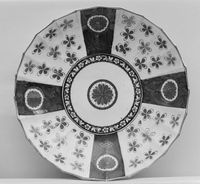
The Old Courtesan (La Belle qui fut heaulmière)
Auguste Rodin
An item at Metropolitan Museum of Art
Incorporated into the left pilaster on The Gates of Hell, the withered old woman evoked a moral connection between sin and the ravages of time. The harrowing veracity of the independent sculpture accords with a statement of Rodin’s: "Character is the intense truth of any natural [sight], beautiful or ugly."
European Sculpture and Decorative Arts
An exhibit at Metropolitan Museum of Art
The fifty thousand objects in the Museum's comprehensive and historically important collection of European sculpture and decorative arts reflect the development of a number of art forms in Western European countries from the early fifteenth through the early twentieth century. The holdings include sculpture in many sizes and media, woodwork and furniture, ceramics and glass, metalwork and jewelry, horological and mathematical instruments, and tapestries and textiles. Ceramics made in Asia for export to European markets and sculpture and decorative arts produced in Latin America during this period are also included among these works.




